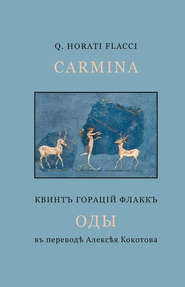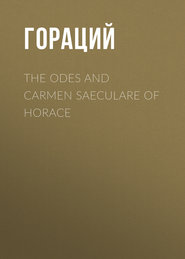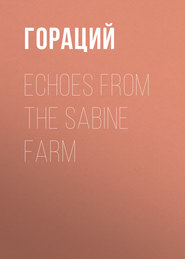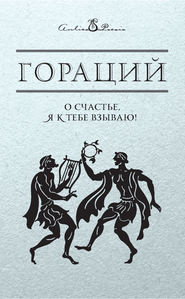По всем вопросам обращайтесь на: info@litportal.ru
(©) 2003-2024.
✖
The Works of Horace
Настройки чтения
Размер шрифта
Высота строк
Поля
O Iccius, you now covet the opulent treasures of the Arabians, and are preparing vigorous for a war against the kings of Saba, hitherto unconquered, and are forming chains for the formidable Mede. What barbarian virgin shall be your slave, after you have killed her betrothed husband? What boy from the court shall be made your cup-bearer, with his perfumed locks, skilled to direct the Seric arrows with his father's bow? Who will now deny that it is probable for precipitate rivers to flow back again to the high mountains, and for Tiber to change his course, since you are about to exchange the noble works of Panaetius, collected from all parts, together with the whole Socratic family, for Iberian armor, after you had promised better things?
ODE XXX.
TO VENUS.
O Venus, queen of Gnidus and Paphos, neglect your favorite Cyprus, and transport yourself into the beautiful temple of Glycera, who is invoking you with abundance of frankincense. Let your glowing son hasten along with you, and the Graces with their zones loosed, and the Nymphs, and Youth possessed of little charm without you and Mercury.
ODE XXXI.
TO APOLLO.
What does the poet beg from Phoebus on the dedication of his temple? What does he pray for, while he pours from the flagon the first libation? Not the rich crops of fertile Sardinia: not the goodly flocks of scorched Calabria: not gold, or Indian ivory: not those countries, which the still river Liris eats away with its silent streams. Let those to whom fortune has given the Calenian vineyards, prune them with a hooked knife; and let the wealthy merchant drink out of golden cups the wines procured by his Syrian merchandize, favored by the gods themselves, inasmuch as without loss he visits three or four times a year the Atlantic Sea. Me olives support, me succories and soft mallows. O thou son of Latona, grant me to enjoy my acquisitions, and to possess my health, together with an unimpaired understanding, I beseech thee; and that I may not lead a dishonorable old age, nor one bereft of the lyre.
ODE XXXII.
TO HIS LYRE.
We are called upon. If ever, O lyre, in idle amusement in the shade with thee, we have played anything that may live for this year and many, come on, be responsive to a Latin ode, my dear lyre—first tuned by a Lesbian citizen, who, fierce in war, yet amid arms, or if he had made fast to the watery shore his tossed vessel, sung Bacchus, and the Muses, and Venus, and the boy, her ever-close attendant, and Lycus, lovely for his black eyes and jetty locks. O thou ornament of Apollo, charming shell, agreeable even at the banquets of supreme Jove! O thou sweet alleviator of anxious toils, be propitious to me, whenever duly invoking thee!
ODE XXXIII.
TO ALBIUS TIBULLUS.
Grieve not too much, my Albius, thoughtful of cruel Glycera; nor chant your mournful elegies, because, as her faith being broken, a younger man is more agreeable, than you in her eyes. A love for Cyrus inflames Lycoris, distinguished for her little forehead: Cyrus follows the rough Pholoe; but she-goats shall sooner be united to the Apulian wolves, than Pholoe shall commit a crime with a base adulterer. Such is the will of Venus, who delights in cruel sport, to subject to her brazen yokes persons and tempers ill suited to each other. As for myself, the slave-born Myrtale, more untractable than the Adriatic Sea that forms the Calabrian gulfs, entangled me in a pleasing chain, at the very time that a more eligible love courted my embraces.
ODE XXXIV.
AGAINST THE EPICURIANS.
A remiss and irregular worshiper of the gods, while I professed the errors of a senseless philosophy, I am now obliged to set sail back again, and to renew the course that I had deserted. For Jupiter, who usually cleaves the clouds with his gleaming lightning, lately drove his thundering horses and rapid chariot through the clear serene; which the sluggish earth, and wandering rivers; at which Styx, and the horrid seat of detested Taenarus, and the utmost boundary of Atlas were shaken. The Deity is able to make exchange between the highest and the lowest, and diminishes the exalted, bringing to light the obscure; rapacious fortune, with a shrill whizzing, has borne off the plume from one head, and delights in having placed it on another.
ODE XXXV.
TO FORTUNE.
O Goddess, who presidest over beautiful Antium; thou, that art ready to exalt mortal man from the most abject state, or to convert superb triumphs into funerals! Thee the poor countryman solicits with his anxious vows; whosoever plows the Carpathian Sea with the Bithynian vessel, importunes thee as mistress of the ocean. Thee the rough Dacian, thee the wandering Scythians, and cities, and nations, and warlike Latium also, and the mothers of barbarian kings, and tyrants clad in purple, fear. Spurn not with destructive foot that column which now stands firm, nor let popular tummult rouse those, who now rest quiet, to arms—to arms—and break the empire. Necessity, thy minister, alway marches before thee, holding in her brazen hand huge spikes and wedges, nor is the unyielding clamp absent, nor the melted lead. Thee Hope reverences, and rare Fidelity robed in a white garment; nor does she refuse to bear thee company, howsoever in wrath thou change thy robe, and abandon the houses of the powerful. But the faithless crowd [of companions], and the perjured harlot draw back. Friends, too faithless to bear equally the yoke of adversity, when casks are exhausted, very dregs and all, fly off. Preserve thou Caesar, who is meditating an expedition against the Britons, the furthest people in the world, and also the new levy of youths to be dreaded by the Eastern regions, and the Red Sea. Alas! I am ashamed of our scars, and our wickedness, and of brethren. What have we, a hardened age, avoided? What have we in our impiety left unviolated! From what have our youth restrained their hands, out of reverence to the gods? What altars have they spared? O mayest thou forge anew our blunted swords on a different anvil against the Massagetae and Arabians.
ODE XXXVI.
This is a joyful occasion to sacrifice both with incense and music of the lyre, and the votive blood of a heifer to the gods, the guardians of Numida; who, now returning in safety from the extremest part of Spain, imparts many embraces to his beloved companions, but to none more than his dear Lamia, mindful of his childhood spent under one and the same governor, and of the gown, which they changed at the same time. Let not this joyful day be without a Cretan mark of distinction; let us not spare the jar brought forth [from the cellar]; nor, Salian-like, let there be any cessation of feet; nor let the toping Damalis conquer Bassus in the Thracian Amystis; nor let there be roses wanting to the banquet, nor the ever-green parsley, nor the short-lived lily. All the company will fix their dissolving eyes on Damalis; but she, more luxuriant than the wanton ivy, will not be separated from her new lover.
ODE XXXVII.
TO HIS COMPANIONS.
Now, my companions, is the time to carouse, now to beat the ground with a light foot: now is the time that was to deck the couch of the gods with Salian dainties. Before this, it was impious to produce the old Caecuban stored up by your ancestors; while the queen, with a contaminated gang of creatures, noisome through distemper, was preparing giddy destruction for the Capitol and the subversion of the empire, being weak enough to hope for any thing, and intoxicated with her prospering fortune. But scarcely a single ship preserved from the flames bated her fury; and Caesar brought down her mind, inflamed with Egyptian wine, to real fears, close pursuing her in her flight from Italy with his galleys (as the hawk pursues the tender doves, or the nimble hunter the hare in the plains of snowy Aemon), that he might throw into chains this destructive monster [of a woman]; who, seeking a more generous death, neither had an effeminate dread of the sword, nor repaired with her swift ship to hidden shores. She was able also to look upon her palace, lying in ruins, with a countenance unmoved, and courageous enough to handle exasperated asps, that she might imbibe in her body the deadly poison, being more resolved by having pre-meditated her death: for she was a woman of such greatness of soul, as to scorn to be carried off in haughty triumph, like a private person, by rough Liburnians.
ODE XXXVIII.
TO HIS SERVANT.
Boy, I detest the pomp of the Persians; chaplets, which are woven with the rind of the linden, displease me; give up the search for the place where the latter rose abides. It is my particular desire that you make no laborious addition to the plain myrtle; for myrtle is neither unbecoming you a servant, nor me, while I quaff under this mantling vine.
THE SECOND BOOK OF THE ODES OF HORACE
ODE I.
TO ASINIUS POLLIO.
You are treating of the civil commotion, which began from the consulship of Metelius, and the causes, and the errors, and the operations of the war, and the game that fortune played, and the pernicious confederacy of the chiefs, and arms stained with blood not yet expiated—a work full of danger and hazard: and you are treading upon fires, hidden under deceitful ashes: let therefore the muse that presides over severe tragedy, be for a while absent from the theaters; shortly, when thou hast completed the narrative of the public affairs, you shall resume your great work in the tragic style of Athens, O Pollio, thou excellent succor to sorrowing defendants and a consulting senate; [Pollio,] to whom the laurel produced immortal honors in the Dalmatian triumph. Even now you stun our ears with the threatening murmur of horns: now the clarions sound; now the glitter of arms affrights the flying steeds, and dazzles the sight of the riders. Now I seem to hear of great commanders besmeared with, glorious dust, and the whole earth subdued, except the stubborn soul of Cato. Juno, and every other god propitious to the Africans, impotently went off, leaving that land unrevenged; but soon offered the descendants of the conquerors, as sacrifices to the manes of Jugurtha. What plain, enriched by Latin blood, bears not record, by its numerous sepulchres, of our impious battles, and of the sound of the downfall of Italy, heard even by the Medes? What pool, what rivers, are unconscious of our deplorable war? What sea have not the Daunian slaughters discolored? What shore is unstained by our blood? Do not, however, rash muse, neglecting your jocose strains, resume the task of Caean plaintive song, but rather with me seek measures of a lighter style beneath some love-sequestered grotto.
ODE II.
TO CRISPUS SALLUSTIUS.
O Crispus Sallustius, thou foe to bullion, unless it derives splendor from a moderate enjoyment, there is no luster in money concealed in the niggard earth. Proculeius shall live an extended age, conspicuous for fatherly affection to brothers; surviving fame shall bear him on an untiring wing. You may possess a more extensive dominion by controlling a craving disposition, than if you could unite Libya to the distant Gades, and the natives of both the Carthages were subject to you alone. The direful dropsy increases by self-indulgence, nor extinguishes its thirst, unless the cause of the disorder has departed from the veins, and the watery languor from the pallid body. Virtue, differing from the vulgar, excepts Phraates though restored to the throne of Cyrus, from the number of the happy; and teaches the populace to disuse false names for things, by conferring the kingdom and a safe diadem and the perpetual laurel upon him alone, who can view large heaps of treasure with undazzled eye.
ODE III.
TO QUINTUS DELLIUS.
O Dellius, since thou art born to die, be mindful to preserve a temper of mind even in times of difficulty, as well an restrained from insolent exultation in prosperity: whether thou shalt lead a life of continual sadness, or through happy days regale thyself with Falernian wine of the oldest date, at case reclined in some grassy retreat, where the lofty pine and hoary poplar delight to interweave their boughs into a hospitable shade, and the clear current with trembling surface purls along the meandering rivulet. Hither order [your slaves] to bring the wine, and the perfumes, and the too short-lived flowers of the grateful rose, while fortune, and age; and the sable threads of the three sisters permit thee. You must depart from your numerous purchased groves; from your house also, and that villa, which the yellow Tiber washes, you must depart: and an heir shall possess these high-piled riches. It is of no consequence whether you are the wealthy descendant of ancient Inachus, or whether, poor and of the most ignoble race, you live without a covering from the open air, since you are the victim of merciless Pluto. We are all driven toward the same quarter: the lot of all is shaken in the urn; destined sooner or later to come forth, and embark us in [Charon's] boat for eternal exile.
ODE IV.
TO XANTHIAS PHOCEUS.
Let not, O Xanthias Phoceus, your passion for your maid put you out of countenance; before your time, the slave Briseis moved the haughty Achilles by her snowy complexion. The beauty of the captive Tecmessa smote her master, the Telamonian Ajax; Agamemnon, in the midst of victory, burned for a ravished virgin: when the barbarian troops fell by the hands of their Thessalian conqueror, and Hector, vanquished, left Troy more easily to be destroyed by the Grecians. You do not know that perchance the beautiful Phyllis has parents of condition happy enough to do honor to you their son-in-law. Certainly she must be of royal race, and laments the unpropitiousness of her family gods. Be confident, that your beloved is not of the worthless crowd; nor that one so true, so unmercenary, could possibly be born of a mother to be ashamed of. I can commend arms, and face, and well-made legs, quite chastely: avoid being jealous of one, whose age is hastening onward to bring its eighth mastrum to a close.
ODE V.
Not yet is she fit to be broken to the yoke; not yet is she equal to the duties of a partner, nor can she support the weight of the bull impetuously rushing to enjoyment. Your heifer's sole inclination is about verdant fields, one while in running streams soothing the grievous heat; at another, highly delighted to frisk with the steerlings in the moist willow ground. Suppress your appetite for the immature grape; shortly variegated autumn will tinge for thee the lirid clusters with a purple hue. Shortly she shall follow you; for her impetuous time runs on, and shall place to her account those years of which it abridges you; shortly Lalage with a wanton assurance will seek a husband, beloved in a higher degree than the coy Pholoe, or even Chloris; shining as brightly with her fair shoulder, as the spotless moon upon the midnight sea, or even the Gnidian Gyges, whom if you should intermix in a company of girls, the undiscernible difference occasioned by his flowing locks and doubtful countenance would wonderfully impose even on sagacious strangers.
ODE VI.
TO SEPTIMUS.
Septimus, who art ready to go with me, even to Gades, and to the Cantabrian, still untaught to bear our yoke, and the inhospitable Syrtes, where the Mauritanian wave perpetually boils. O may Tibur, founded by a Grecian colony, be the habitation of my old age! There let there be an end to my fatigues by sea, and land, and war; whence if the cruel fates debar me, I will seek the river of Galesus, delightful for sheep covered with skins, and the countries reigned over by Lacedaemonian Phalantus. That corner of the world smiles in my eye beyond all others; where the honey yields not to the Hymettian, and the olive rivals the verdant Venafrian: where the temperature of the air produces a long spring and mild winters, and Aulon friendly to the fruitful vine, envies not the Falernian grapes. That place, and those blest heights, solicit you and me; there you shall bedew the glowing ashes of your poet friend with a tear due [to his memory].
ODE VII.
TO POMPEIUS VARUS.
O thou, often reduced with me to the last extremity in the war which Brutus carried on, who has restored thee as a Roman citizen, to the gods of thy country and the Italian air, Pompey, thou first of my companions; with whom I have frequently broken the tedious day in drinking, having my hair, shining with the Syrian maiobathrum, crowned [with flowers]! Together with thee did I experience the [battle of] Phillippi and a precipitate flight, having shamefully enough left my shield; when valor was broken, and the most daring smote the squalid earth with their faces. But Mercury swift conveyed me away, terrified as I was, in a thick cloud through the midst of the enemy. Thee the reciprocating sea, with his tempestuous waves, bore back again to war. Wherefore render to Jupiter the offering that is due, and deposit your limbs, wearied with a tedious war, under my laurel, and spare not the casks reserved for you. Fill up the polished bowls with care-dispelling Massic: pour out the perfumed ointments from the capacious shells. Who takes care to quickly weave the chaplets of fresh parsely or myrtle? Whom shall the Venus pronounce to be master of the revel? In wild carouse I will become frantic as the Bacchanalians. 'Tis delightful to me to play the madman, on the reception of my friends.
ODE VIII.
TO BARINE.
Другие электронные книги автора Квинт Гораций Флакк
Другие аудиокниги автора Квинт Гораций Флакк
Избранные оды




 4.67
4.67












